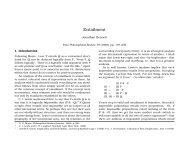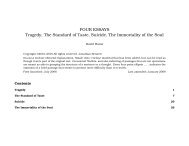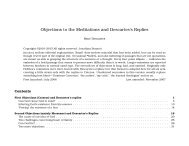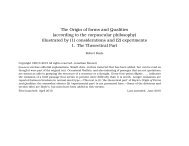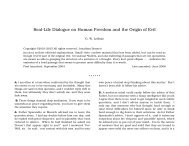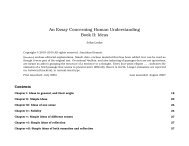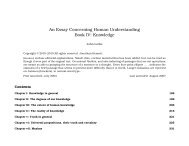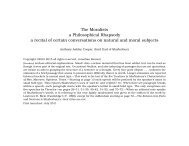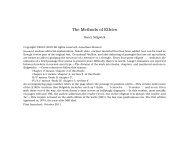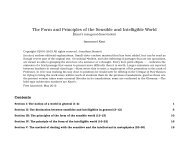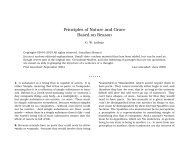A Vindication of the Rights of Woman with - Early Modern Texts
A Vindication of the Rights of Woman with - Early Modern Texts
A Vindication of the Rights of Woman with - Early Modern Texts
Create successful ePaper yourself
Turn your PDF publications into a flip-book with our unique Google optimized e-Paper software.
The <strong>Rights</strong> <strong>of</strong> <strong>Woman</strong> Mary Wollstonecraft 13: Harm done by women’s ignorance<br />
3: Dressing up<br />
Ignorance, and <strong>the</strong> mistaken cunning that nature sharpens<br />
in weak heads as a means <strong>of</strong> self-preservation, make women<br />
very fond <strong>of</strong> dress, and produce <strong>the</strong> vanity that such a<br />
fondness naturally generates, to <strong>the</strong> exclusion <strong>of</strong> spirited<br />
attempts to grow and improve.<br />
I agree <strong>with</strong> Rousseau that <strong>the</strong> physical part <strong>of</strong> <strong>the</strong> art<br />
<strong>of</strong> pleasing consists in ornaments; and for just that reason<br />
I want to guard girls against <strong>the</strong> contagious fondness for<br />
dress that is so common to weak women, so that <strong>the</strong>y don’t<br />
remain stuck in <strong>the</strong> physical part. Women who think <strong>the</strong>y<br />
can long please <strong>with</strong>out <strong>the</strong> aid <strong>of</strong> <strong>the</strong> mind—i.e. <strong>with</strong>out <strong>the</strong><br />
moral art <strong>of</strong> pleasing—must be weak indeed. The moral art<br />
is never accompanied by ignorance; it is essentially different<br />
from and superior to <strong>the</strong> sportiveness <strong>of</strong> innocence that is so<br />
pleasing to refined libertines <strong>of</strong> both sexes. (It may indeed be<br />
pr<strong>of</strong>anation to use <strong>the</strong> word ‘art’ in connection <strong>with</strong> <strong>the</strong> grace<br />
that is •an effect <strong>of</strong> virtue and not •<strong>the</strong> motive <strong>of</strong> action.)<br />
[MW writes that a liking for fine clo<strong>the</strong>s and ornamentation<br />
is ‘natural to mankind’—common to both sexes and<br />
all social levels. (In <strong>the</strong> most barbarous states only men are<br />
allowed to act on this; that our society allows women to take<br />
part in this too is ‘at least one step in civilisation’.) When <strong>the</strong><br />
mind is not sufficiently opened to take pleasure in reflection,<br />
<strong>the</strong> body will be adorned <strong>with</strong> great care, and ambition will<br />
appear in tattooing or painting it.<br />
[MW discusses reasons why vanity about dress is in our<br />
society more <strong>of</strong> a feminine than a masculine trait. The main<br />
reason is just that men are allowed to have o<strong>the</strong>r interests<br />
and pursuits, whereas women aren’t. Also, a man can avoid<br />
clashing <strong>with</strong> most o<strong>the</strong>r men, whereas women]. . . are all<br />
rivals. Before marriage it is <strong>the</strong>ir business to please men;<br />
and after marriage most <strong>of</strong> <strong>the</strong>m follow <strong>the</strong> same scent, <strong>with</strong><br />
103<br />
all <strong>the</strong> persistence <strong>of</strong> instinct. Even virtuous women never<br />
forget <strong>the</strong>ir sex in company, for <strong>the</strong>y are always trying to be<br />
agreeable. A female beauty and a male wit seem to be equally<br />
anxious to draw <strong>the</strong> attention <strong>of</strong> <strong>the</strong> company to <strong>the</strong>mselves;<br />
and <strong>the</strong> animosity <strong>of</strong> contemporary wits is proverbial.<br />
So it’s not surprising that <strong>the</strong> sole ambition <strong>of</strong> woman<br />
centres on beauty. . . and that <strong>the</strong>re are perpetual rivalships.<br />
They are all running <strong>the</strong> same race; <strong>the</strong>y rise above <strong>the</strong> virtue<br />
<strong>of</strong> mortals if <strong>the</strong>y didn’t view each o<strong>the</strong>r <strong>with</strong> a suspicious<br />
and even envious eye. . . .<br />
4: Sensibility<br />
Women are supposed to have more sensibility [see Glossary]<br />
than men and even more humanity, and <strong>the</strong>ir strong attachments<br />
and instantaneous emotions <strong>of</strong> compassion are<br />
cited as pro<strong>of</strong>s <strong>of</strong> this. But <strong>the</strong> clinging affection <strong>of</strong> ignorance<br />
seldom has anything noble in it; like <strong>the</strong> affections <strong>of</strong> children<br />
and <strong>the</strong> lower animals it is mostly a form <strong>of</strong> selfishness. I<br />
have known many weak women whose sensibility was entirely<br />
taken up by <strong>the</strong>ir husbands; and as for <strong>the</strong>ir humanity,<br />
it was very faint indeed, or ra<strong>the</strong>r it was only a transient<br />
emotion <strong>of</strong> compassion, ‘Humanity does not consist in a<br />
squeamish ear’, says an eminent orator [Charles James Fox]. ‘It<br />
belongs to <strong>the</strong> mind as well as <strong>the</strong> nerves.’<br />
This exclusive kind <strong>of</strong> affection, though it degrades <strong>the</strong><br />
individual, shouldn’t be <strong>of</strong>fered as evidence <strong>of</strong> <strong>the</strong> inferiority<br />
<strong>of</strong> <strong>the</strong> ·female· sex, because it is <strong>the</strong> natural consequence <strong>of</strong><br />
confined views. Even women <strong>of</strong> superior sense, when <strong>the</strong>ir<br />
attention is focussed on little employments and private plans,<br />
rarely rise to heroism. . . . I <strong>the</strong>refore agree <strong>with</strong> <strong>the</strong> moralist<br />
[Adam Smith] who says that women seldom have as much<br />
generosity as men, and that <strong>the</strong>ir narrow affections—<strong>of</strong>ten<br />
put ahead <strong>of</strong> justice and humanity—make <strong>the</strong> sex apparently



